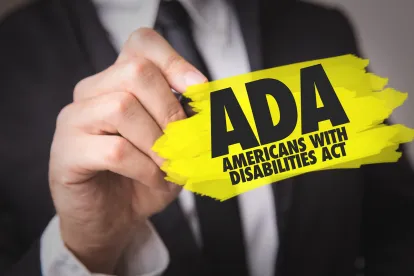On April 7, 2021, the Eleventh Circuit United States Court of Appeals vacated a trial court ruling from 2017 which held that Winn-Dixie Stores violated the Americans with Disabilities Act (“ADA”) because the Plaintiff, who is visually impaired, could not access the company’s website. In Gil v. Winn-Dixie Stores, the Court held that: (1) websites, unlike “actual, physical spaces,” do not constitute a “public accommodation” as defined by the ADA; and (2) Winn-Dixie’s limited-use website did not create an “intangible barrier” to access its services.
The Plaintiff requires the use of a screen reading software, which “vocalizes the content” of websites and web pages to use the internet, and Plaintiff was unable to access Winn-Dixie’s website with the software. At the time of the lawsuit in 2017, Winn-Dixie did not offer any sales through its website, and the primary functions that Plaintiff wanted to use the website for were: (1) to re-fill existing prescriptions for pickup in-store, and (2) to link digital manufacturer coupons to his Winn-Dixie rewards card such that coupons will automatically be applied at check out at a physical store.
The Court, taking a textualist approach, explained in a 2-1 decision, that websites were not included in the 12 types of “public accommodations” listed in Title III of the ADA, and held that only Congress could amend this list to include websites. The Court held that even if a website was a service of the brick and mortar store and a place of public accommodation, Winn-Dixie did not discriminate against individuals with visual disabilities because individuals still had complete access to the goods and services offered by the place of public accommodation, the Winn-Dixie store. The Court also rejected the “nexus” standard, developed by the Ninth Circuit and used by other courts, in which websites can be treated as a part of a place of public accommodation if there is enough of a nexus between the website and the store. The Court declined to use the nexus standard and held that there was “no basis for it in the statute or in our precedent.”
The decision also includes a 34-page dissenting opinion from Circuit Judge Jill Pryor, indicating that she felt that the Winn-Dixie website offered separate and additional services, and as such, the fact that the website was not accessible via the use of a screen reading software violated the ADA.
The Eleventh Circuit now joins the Third Circuit, Sixth Circuit, and Ninth Circuit in holding that “places of public accommodation” are limited to physical locations, while other jurisdictions, such as the First Circuit and Seventh Circuit, have held that the ADA applies to websites.
It remains to be seen whether this decision will be reviewed by the United States Supreme Court. However, this decision is likely to be viewed in a favorable light by business entities within the jurisdiction of the Eleventh Circuit. This ruling may not apply to businesses who operate websites in which customers can directly buy goods or services, or for businesses which operate in other jurisdictions where the ADA has been held to apply to websites. Businesses should also ensure they are aware of the local and state disability laws regarding website accessibility.
School districts throughout the country should view this decision with caution and ensure their websites are accessible to all students and parents. The Office of Civil Rights has issued guidance suggesting that the nondiscrimination provisions of the ADA and Section 504 of the Rehabilitation Act apply to all online content created by school districts. Especially considering the COVID-19 pandemic, school districts should strive to ensure that websites and web content are accessible to individuals with disabilities.



 />i
/>i
